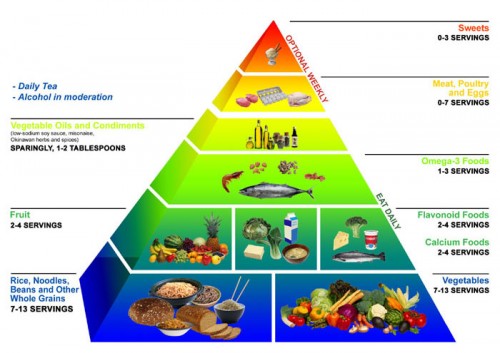The Okinawan diet is made up mostly of vegetables and legumes, especially soy. It’s low in calories and fat, and high in complex carbohydrates. Most of those carbohydrates come from vegetables, with only a small amount of grains or seeds, and no sugar or refined sweets. There is only a little red meat and a minimal amount of dairy. Fish is consumed in moderation, and alcohol consumption is limited to an occasional drink.
Common foods in this diet include sweet potatoes, soy, bitter melon, shiitake mushrooms, burdock, jasmine tea, seaweed, and an interesting array of herbs and spices. Here’s a few that you should be able to buy in most grocery stores or Asian markets:
Sweet Potatoes
In the past, less affluent Okinawans ate sweet potatoes. Lots and lots of sweet potatoes. Rice, especially white rice, was more expensive and was a bit of a status symbol: it was something consumed only by the wealthier folks. The cool thing is that sweet potatoes are nutrient-dense and rich in vitamins A and C, calcium and potassium. They’re also high in fiber, and contain vitamin E.
Soy
The traditional Okinawan diet includes soy in the form of miso paste and tofu. Soy is an excellent source of plant protein, and it provides the bulk of the protein in the Okinawa diet. Soy also contains phytochemicals called flavonoids and phytoestrogens, which may have health promoting qualities.
Bitter Melon
Bitter melon is a gourd that’s also known as goya, goo-fa or ku gua. It’s used in salads, stir-fried meals and can be made into a juice or tea. It’s high in fiber and vitamin C, plus it has a number of beneficial phytochemicals. It may be difficult to find bitter melon in your local grocery store, but Asian food markets probably carry it.
Shiitake Mushrooms
These large mushrooms are found in many types of Asian cooking. They’re nutritious and they might have some health benefits that could impact your immune system and help regulate cholesterol. You can find these mushrooms in the produce section of most grocery stores, or they may be found with the canned vegetables.
Seaweed
Kombu, hijiki, mozuku, and katsuobushi are three types of seaweed commonly used in Okinawa. They’re often served with noodles, in salads, in stir fries, and with vegetables. Seaweed is high in iodine, folate, calcium, iron, magnesium andastaxanthin. It’s not easy to find these types of seaweed in a typical grocery store, but you may be able to find nori, which is sold in thin sheets, and sometimes used when preparing sushi.
Herbs and Spices
Some of the seasonings used in this diet have potential for health benefits and add flavor without adding any calories. They include turmeric, mugwort, Okinawan peppers, and fennel seeds.
The Okinawan diet has almost no dairy products, and very little red meat and few of the typical grains most of us are used to eating.
Why the Diet May Work
The Okinawan diet is low in calories and high in fiber, so it can help you lose or maintain weight, which is important for avoiding chronic diseases like cardiovascular disease, diabetes and some forms of cancer.
You could say the Okinawan diet is an anti-inflammatory diet, which can help to reduce the risk of those chronic diseases for a number of reasons:
Low fat (especially saturated fat), but still high in omega-3 fatty acids. At least some forms of saturated fats can increase inflammation and omega-3’s tend to reduce inflammation.
Low in refined carbohydrates (like sugar), so it doesn’t have a big impact on your blood sugar levels. That’s good because blood sugar spikes could contribute to a pro-inflammatory state in your body that increases the risk of chronic disease and inflammation.
High in vitamins C, E and A, and phytochemicals. These nutrients work as antioxidants to protect your cells from free radical damage (things like smoke, pollution, rancid fats and oils and so on). These nutrients might help to reduce inflammation.



Post your comment